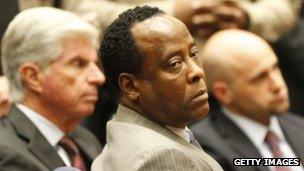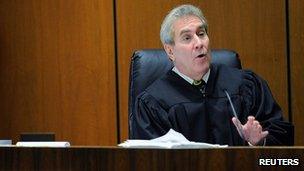Viewpoint: Justice for Conrad Murray
- Published
- comments

Murray will be sentenced on 29 November, and was held without bail after his conviction
The last doctor of Michael Jackson's life was convicted of manslaughter by a California jury because the law demanded it and the facts supported it.
Dr Conrad Murray was at Jackson's home when the pop star died, sloppily administering medicine that should only have been administered in a hospital.
There are, I suspect, few jurors in the world who would have gone out of their way to search for a more complex narrative in order to spare the defendant a few years or months in jail.
Throughout the trial, Murray's lawyers tried gingerly to blame Jackson himself for his own death, a tactic which reflected both the desperation of the defence case and the nature of California's involuntary manslaughter statute.
Team Murray hoped that if jurors blamed the singer himself for an overdose, they might mete out a measure of sympathy for a doctor who, like so many other doctors who treat celebrities, thought he had his patient under control when he did not.
Bedside failings
California law, however, makes this a very difficult proposition. It is not enough to demonstrate, as Murray's lawyers did, that the victim of the crime contributed to his own death.
Even if Jackson injected himself with the drug that ultimately killed him, prosecutors told jurors in closing arguments, Murray should have foreseen that this would occur because he knew that Jackson liked to "push" his own drugs.
Given this standard, what chance did Murray ever really have?
The prosecution's theory resonated with the jury because it was founded on the language of the statute as announced during jury instructions. But when you stop and think about it, it is truly an extraordinary thing.
California is about to send a man to prison - for a while anyway - even though many reasonable people would agree that Jackson played a prominent role in his own death.
The law says that Murray should have known better, even if Jackson did not; that the doctor had a responsibility to his patient even if his patient were bent on pushing past medically acceptable standards.
You could say, as Murray's lawyers implied, that the good doctor was in the wrong place at the wrong time. They acknowledged, as they had to, that their client's professional performance during the fatal episode was not what any of us would want from our own bedside doctors.
But the defence lawyers tried to take the mens rea element, the criminal element, out of the case.
Murray may have been a quack, they argued, but he had absolutely no bad intent toward the richest patient he or any private doctor was ever likely to have.
Prison pending
Or you could say, as prosecutors did, that any good doctor would not have come anywhere near the circus that was Jackson's relationship with prescription drugs.

How long Murray will spend behind bars is up to Judge Michael Pastor
Murray did not officially represent the King of Pop for long. But like everyone else in the world he surely knew that he was taking on a patient with a reputation for using drugs to try to tune out the demons which afflicted him.
The rest of world envisioned a tragic end for Jackson along these lines. After covering his 2005 molestation trial I certainly did. Why didn't Murray?
The just-completed trial was a good one, in which the lawyers ably represented their causes and the trial judge, Los Angeles Superior Court Judge Michael Pastor, did a laudable job keeping control of a celebrity case.
On 29 November, during sentencing, I believe that Judge Pastor will show more mercy to Murray than did his jurors.
Murray faces anywhere from probation to four years, but it is clear from the fact that he is now in jail - the judge denied bail pending sentencing - that Judge Pastor is going to give him some prison time.
My bet is that the sentence will be towards the lower side.
California's prisons are notoriously overcrowded. In fact, the state has been forced by the United States Supreme Court to reduce the prison population to more manageable levels.
Michael Jackson's billion or so fans may argue that Conrad Murray deserves the hardest time possible. But the truth of the matter is that the eternal law of economics is on Murray's side.
He made terrible errors in judgment, and he's paying the price.
And none of that will ever bring back Michael Jackson or tell us what next might have happened had he lived through that day.
Andrew Cohen is a correspondent for The Atlantic and the chief legal analyst for CBS Radio News.
- Published7 November 2011
- Published7 November 2011
- Published4 November 2011
- Published30 November 2011